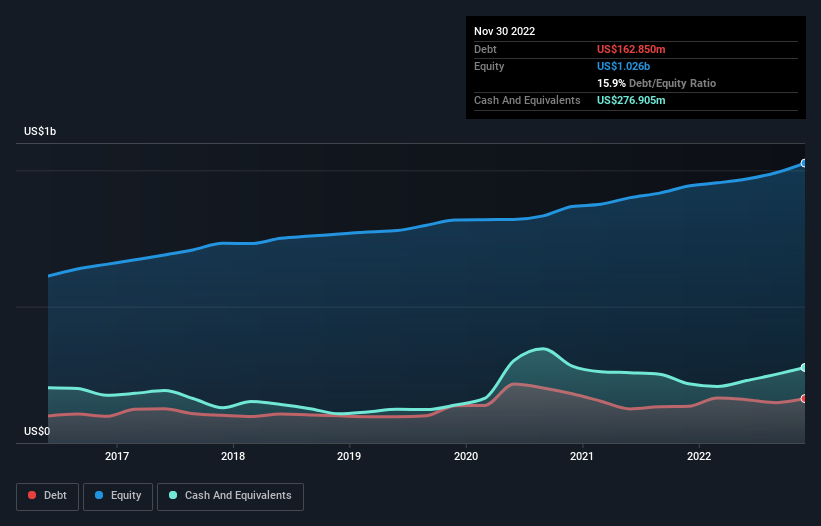
Some say volatility, rather than debt, is the best way to think about risk as an investor, but Warren Buffett famously said that 'Volatility is far from synonymous with risk.' When we think about how risky a company is, we always like to look at its use of debt, since debt overload can lead to ruin. Importantly, PriceSmart, Inc. (NASDAQ:PSMT) does carry debt. But is this debt a concern to shareholders?
When Is Debt A Problem?
Debt assists a business until the business has trouble paying it off, either with new capital or with free cash flow. If things get really bad, the lenders can take control of the business. However, a more common (but still painful) scenario is that it has to raise new equity capital at a low price, thus permanently diluting shareholders. Having said that, the most common situation is where a company manages its debt reasonably well - and to its own advantage. When we think about a company's use of debt, we first look at cash and debt together.
Check out our latest analysis for PriceSmart
How Much Debt Does PriceSmart Carry?
The image below, which you can click on for greater detail, shows that at November 2022 PriceSmart had debt of US$162.9m, up from US$134.5m in one year. But on the other hand it also has US$276.9m in cash, leading to a US$114.1m net cash position.

A Look At PriceSmart's Liabilities
According to the last reported balance sheet, PriceSmart had liabilities of US$611.6m due within 12 months, and liabilities of US$250.0m due beyond 12 months. Offsetting this, it had US$276.9m in cash and US$35.8m in receivables that were due within 12 months. So its liabilities total US$548.9m more than the combination of its cash and short-term receivables.
This deficit isn't so bad because PriceSmart is worth US$2.11b, and thus could probably raise enough capital to shore up its balance sheet, if the need arose. But we definitely want to keep our eyes open to indications that its debt is bringing too much risk. Despite its noteworthy liabilities, PriceSmart boasts net cash, so it's fair to say it does not have a heavy debt load!
Also good is that PriceSmart grew its EBIT at 10% over the last year, further increasing its ability to manage debt. When analysing debt levels, the balance sheet is the obvious place to start. But ultimately the future profitability of the business will decide if PriceSmart can strengthen its balance sheet over time. So if you're focused on the future you can check out this free report showing analyst profit forecasts.
Finally, a company can only pay off debt with cold hard cash, not accounting profits. While PriceSmart has net cash on its balance sheet, it's still worth taking a look at its ability to convert earnings before interest and tax (EBIT) to free cash flow, to help us understand how quickly it is building (or eroding) that cash balance. In the last three years, PriceSmart's free cash flow amounted to 43% of its EBIT, less than we'd expect. That's not great, when it comes to paying down debt.
Summing Up
Although PriceSmart's balance sheet isn't particularly strong, due to the total liabilities, it is clearly positive to see that it has net cash of US$114.1m. And it also grew its EBIT by 10% over the last year. So we don't have any problem with PriceSmart's use of debt. There's no doubt that we learn most about debt from the balance sheet. However, not all investment risk resides within the balance sheet - far from it. These risks can be hard to spot. Every company has them, and we've spotted 1 warning sign for PriceSmart you should know about.
Of course, if you're the type of investor who prefers buying stocks without the burden of debt, then don't hesitate to discover our exclusive list of net cash growth stocks, today.
New: Manage All Your Stock Portfolios in One Place
We've created the ultimate portfolio companion for stock investors, and it's free.
• Connect an unlimited number of Portfolios and see your total in one currency
• Be alerted to new Warning Signs or Risks via email or mobile
• Track the Fair Value of your stocks
Have feedback on this article? Concerned about the content? Get in touch with us directly. Alternatively, email editorial-team (at) simplywallst.com.
This article by Simply Wall St is general in nature. We provide commentary based on historical data and analyst forecasts only using an unbiased methodology and our articles are not intended to be financial advice. It does not constitute a recommendation to buy or sell any stock, and does not take account of your objectives, or your financial situation. We aim to bring you long-term focused analysis driven by fundamental data. Note that our analysis may not factor in the latest price-sensitive company announcements or qualitative material. Simply Wall St has no position in any stocks mentioned.
About NasdaqGS:PSMT
PriceSmart
Owns and operates U.S.-style membership shopping warehouse clubs in the United States, Central America, the Caribbean, and Colombia.
Flawless balance sheet with solid track record and pays a dividend.
Similar Companies
Market Insights
Community Narratives




